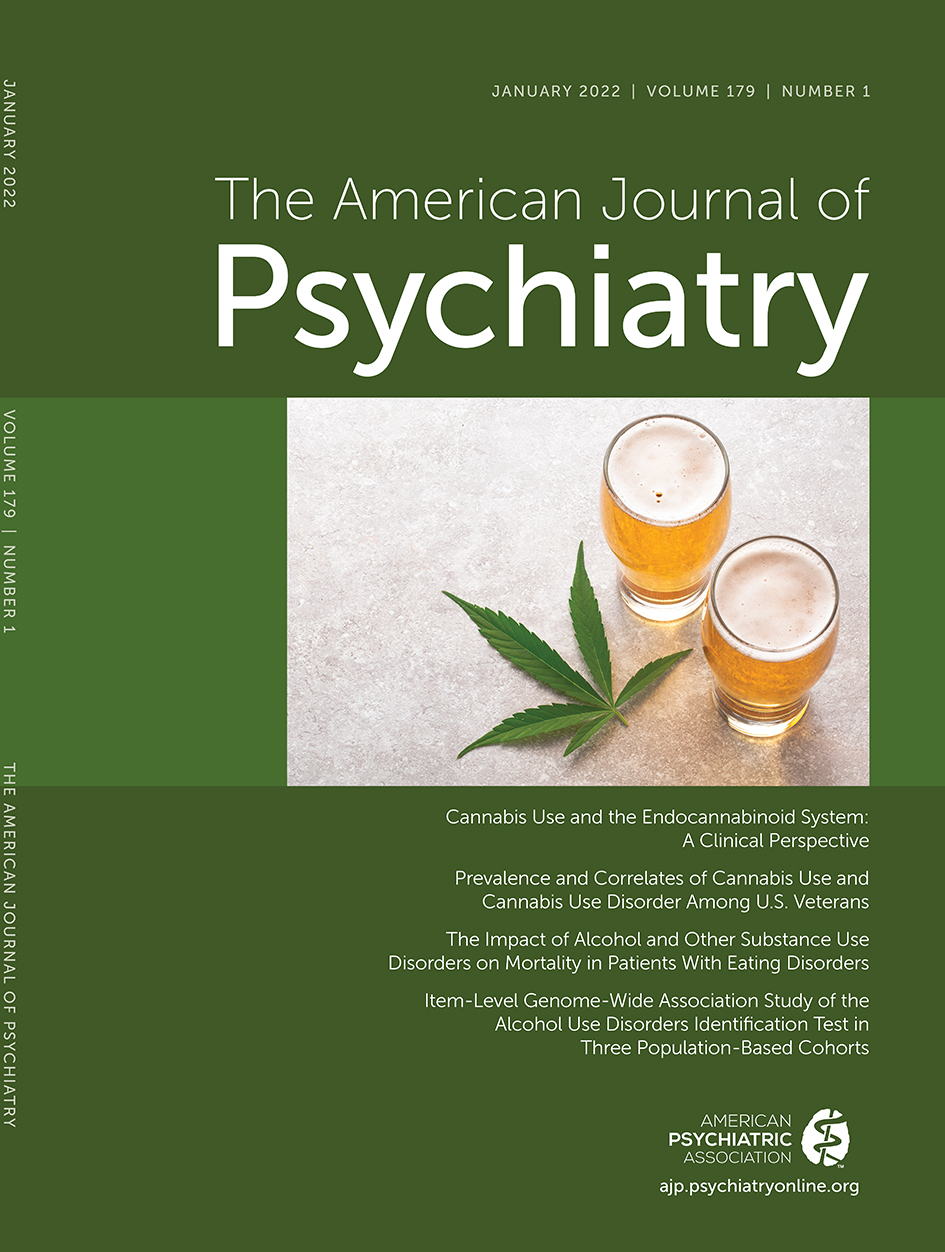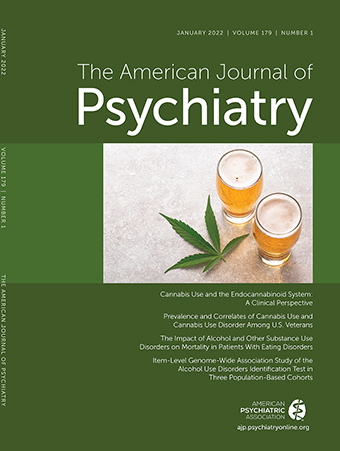To the Editor: COVID-19 was a major cause of excess mortality in 2020 (
1) and individuals with schizophrenia spectrum disorders—comprising conditions that are marked by a range of symptoms that may include hallucinations, delusions, disorganized thinking (speech), grossly disorganized or abnormal behavior, and/or negative symptoms—tend to suffer premature mortality (
2). Examining the risk of mortality due to COVID-19 and its risk factors in individuals with schizophrenia spectrum disorders is important for assessing the potential need for enhanced monitoring and targeted interventions in this population, in a context of limited resources. A retrospective cohort study (
3) at the New York University Langone Health System assessed 7,348 consecutive adult patients for 45 days following laboratory-confirmed COVID-19. In that study, of 75 individuals with a schizophrenia spectrum disorder diagnosis, 26.7% died, compared with 11% among individuals without psychiatric disorders, for an unadjusted odds ratio of 2.93 (95% CI=1.75, 4.92) and an adjusted odds ratio of 2.67 (95% CI=1.48, 4.80), when taking into account the potential confounding effect of several demographic characteristics (sex, age, and race) and medical risk factors (smoking status, hypertension, diabetes, myocardial infarction, heart failure, chronic obstructive pulmonary disease, chronic kidney disease, smoking, and cancer). These important results suggest that schizophrenia spectrum disorders may be a risk factor for mortality per se in patients with COVID-19 and require replication. In this report, we sought to examine this relationship in a sample of adult patients hospitalized for laboratory-confirmed COVID-19 at Greater Paris University Hospitals (AP-HP) (
4–
7).
A multicenter observational retrospective cohort study was conducted at 36 AP-HP hospitals from January 24, until May 1, 2020, using data from the AP-HP Health Data Warehouse (Entrepôt de Données de Santé) (
4–
8). It contains all available clinical data on all inpatient visits for COVID-19 to these medical centers. We included all adults age 18 years or over hospitalized in these medical centers for COVID-19. The data included patient demographic characteristics, laboratory test and reverse-transcriptase–polymerase-chain-reaction (RT-PCR) test results, current medical diagnoses based ICD-10, and death certificates. COVID-19 was ascertained by a positive RT-PCR test from analysis of nasopharyngeal or oropharyngeal swab specimens. We identified patients with schizophrenia spectrum disorders (F20–F29), any other psychiatric disorder (F01–F19, F30–F99), and without a diagnosis of psychiatric disorder, based on ICD-10 diagnosis codes during the visit. Data were also obtained for demographic and medical risk factors associated with severe COVID-19: sex; age, categorized into three groups (18–69, 70–79, ≥80 years) (
9); obesity, defined as having a BMI ≥30 or an ICD-10 diagnosis code for obesity (E66.0, E66.1, E66.2, E66.8, E66.9); current smoking status; and number of medical conditions associated with severe COVID-19 (
10,
11), including diabetes mellitus (E11), diseases of the circulatory system (I00–I99), diseases of the respiratory system (J00–J99), neoplasms (C00–D49), and diseases of the blood and blood-forming organs and certain disorders involving the immune mechanism (D5–D8). Study baseline was defined as the date of hospital admission and the outcome was all-cause mortality from January 24 until May 1.
To examine the association between a diagnosis of schizophrenia spectrum disorder and mortality, we performed multivariable logistic regression models adjusted for sex, age, current smoking status, obesity, and number of medical conditions associated with severe COVID-19. Patients with schizophrenia spectrum disorder were successively compared with 1) a reference group without psychiatric disorders and 2) a reference group with other psychiatric disorders. Statistical significance was fixed a priori at a two-sided p value <0.05. All analyses were conducted in R, version 3.6.3.
We included a total of 15,168 adult patients hospitalized for laboratory-confirmed COVID-19, of which 80 (0.5%) had a diagnosis of schizophrenia spectrum disorder, 777 (5.1%) of any other psychiatric disorder, and 14,311 (94.3%) had no diagnosis of psychiatric disorder. Over a mean follow-up of 9.2 days (SD=12.5), death occurred in 25 (31.2%) patients with a schizophrenia spectrum disorder, 301 (38.7%) patients with any other psychiatric disorder, and 1,276 (8.9%) patients without a diagnosis of psychiatric disorder.
The crude unadjusted analysis showed a significant association between a diagnosis of schizophrenia spectrum disorder and increased mortality (odds ratio=4.64, 95% CI=2.88, 7.48, p<0.001), as compared with patients without a diagnosis of psychiatric disorder. This association was still significant after adjusting for age, sex, and current smoking status (adjusted odds ratio, adjusted odds ratio=4.05, 95% CI=2.41, 6.83, p<0.001). However, this relationship was not significant when adjusting in addition for the number of medical conditions and for obesity (odds ratio=1.54, 95% CI=0.90, 2.64, p=0.113) (Table
1), which were significantly and independently associated with mortality (see Table S1 in the online supplement).
Among patients with any psychiatric disorder, there was no significant association between a diagnosis of schizophrenia spectrum disorder and mortality in the crude analysis (odds ratio=0.72, 95% CI=0.44, 1.18, p=0.191), or after adjusting for age, sex, and current smoking status (adjusted odds ratio=1.21, 95% CI=0.71, 2.08, p=0.486), or when adjusting in addition for the number of medical conditions and for obesity (odds ratio=1.22, 95% CI=0.70, 2.10, p=0.483) (Table
1). Age, sex, and number of medical conditions were significantly and independently associated with mortality in the latter analysis (see Table S2 in the online supplement).
In this study, we sought to examine the association between a diagnosis of schizophrenia spectrum disorder and mortality in patients hospitalized for COVID-19. In line with a previous retrospective cohort study by Nemani et al. (
3), our results indicate that individuals with a diagnosis of schizophrenia spectrum disorder may have a greater risk of mortality than individuals without psychiatric disorders. However, contrasting with that earlier study, in which the association between a schizophrenia spectrum disorder diagnosis and mortality was found to be independent of several demographic and medical risk factors, our findings support that this increased mortality could be mainly explained by the greater number of medical conditions and the higher prevalence of obesity in this population than in people without psychiatric disorders. Discrepancies between these results may come from our ability to adjust our analyses for a wider range of comorbid medical conditions as well as obesity, which importantly increase the risk of severe COVID-19 (
10), and possibly from the shorter duration of follow-up in our study than in the study by Nemani et al. (i.e., 9.2 days versus 45 days). Limitations of our study include the retrospective study design, the relatively short duration of follow-up, potential unmeasured confounding bias, and unknown generalizability of our results to outpatients.
In the context of the COVID-19 pandemic (
1), our findings support the need for targeting patients with schizophrenia spectrum disorders as an at-risk population for interventions and distribution of resources, including screening and priority for COVID-19 vaccines, and for intensifying prevention and treatment of medical risk factors of severe COVID-19 through collaborative primary and mental health care, in order to reduce morbidity and mortality due to COVID-19 in this vulnerable population and help prevent deepened health inequalities (
3).

